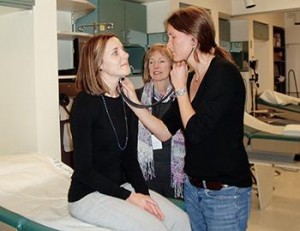DNP—Family Nurse Practitioner
 Our Family Nurse Practitioner (FNP) track within the Doctor of Nursing Practice (DNP) program focuses on providing primary care in the community to patients ranging in age from childhood to elderly. The FNP track strongly emphasizes the broad and comprehensive preparation necessary for primary care practice.
Our Family Nurse Practitioner (FNP) track within the Doctor of Nursing Practice (DNP) program focuses on providing primary care in the community to patients ranging in age from childhood to elderly. The FNP track strongly emphasizes the broad and comprehensive preparation necessary for primary care practice.
As a Family Nurse Practitioner, you will deliver family-focused care in diverse settings to patients from a variety of backgrounds, including underserved and vulnerable populations. FNPs promote preventative care and treatment of acute and chronic conditions in the context of the family unit.
Sites of practice
Graduates from our FNP track practice independently and within larger health care teams. They work in a variety of settings and with diverse populations, including:
- Primary care
- Internal medicine
- Urgent care
- Gastroenterology
- Oncology
- Cardiology
- Neurology
- Dermatology
- HIV care
- Veteran’s health
Curriculum
All Doctor of Nursing Practice tracks are offered as full-time study only.
FNP students are prepared to:
- Perform comprehensive health assessments, including ordering and interpreting diagnostic procedures
- Partner with patients and families for health promotion and disease prevention
- Generate differential diagnoses and manage acute and chronic health problems and distressing symptoms based on a strong biological science foundation
- Prescribe and evaluate therapies (medication and non-medication based)
- Utilize developmental, patient-and family centered approaches
- Act as leaders in healthcare systems
- Advocate for nursing and the role of the Family Nurse Practitioner
Year one
Year one of the DNP program is offered in a hybrid format (50 percent in-person, 50-percent distance learning), and requires that you be on campus one day per week. You will complete core DNP academic classwork with peers across all DNP tracks in the School of Nursing. Content of year one courses includes:
- leadership
- appraisal and application of evidence to advance practice
- health equity
- health systems and policy
- wellness and health promotion, and
- quality improvement
Year Two
In year 2, students establish the foundation of advanced practice education of the lifespan, which includes:
- pathophysiology
- advanced physical assessment, and
- pharmacology
Students build upon this in track-specific advanced assessment, diagnosis/management, and pharmacology. You will gain advanced practice skills from these academic and lab courses to move into clinical placements during spring quarter.
Year Three
As in year two, many courses require in-person attendance with some courses including distance learning methods. In the final year of your program, you will continue clinical training.
In addition, you will work with your supervisory committee to complete a DNP final project in collaboration with a local clinical agency or organization. This project is presented in the form of a final examination.
Role of the DNP
Our DNP program prepares you not only for an advanced practice role but also teaches you how to look at leading-edge research and apply that evidence to your practice.
The DNP program’s additional academic and clinical hours beyond a master’s-level degree gives you a solid foundation to become a leader in the nursing profession. You will work with faculty who are nationally recognized for their research, and also with agencies around the Puget Sound region to gain hundreds of hours of hands-on clinical experience.
By combining advanced practice nursing skills and knowledge of how to evaluate evidence-based research, you are empowered to become a more efficient and effective practitioner.
Post-DNP study
Graduates from the FNP track who are interested in Veteran’s health are eligible to apply for the post-DNP residency program at the VA Puget Sound Center of Education for Interprofessional Collaboration.
National certifications
After successfully completing the FNP track, FNP students are eligible to sit for the FNP certification exams through the American Nurses Credentialing Center (ANCC) or American Academy of Nurse Practitioners Certification Program (AANPCP).
Accreditation
The Doctor of Nursing Practice program at the University of Washington is accredited by the Commission on Collegiate Nursing Education (http://www.ccneaccreditation.org).